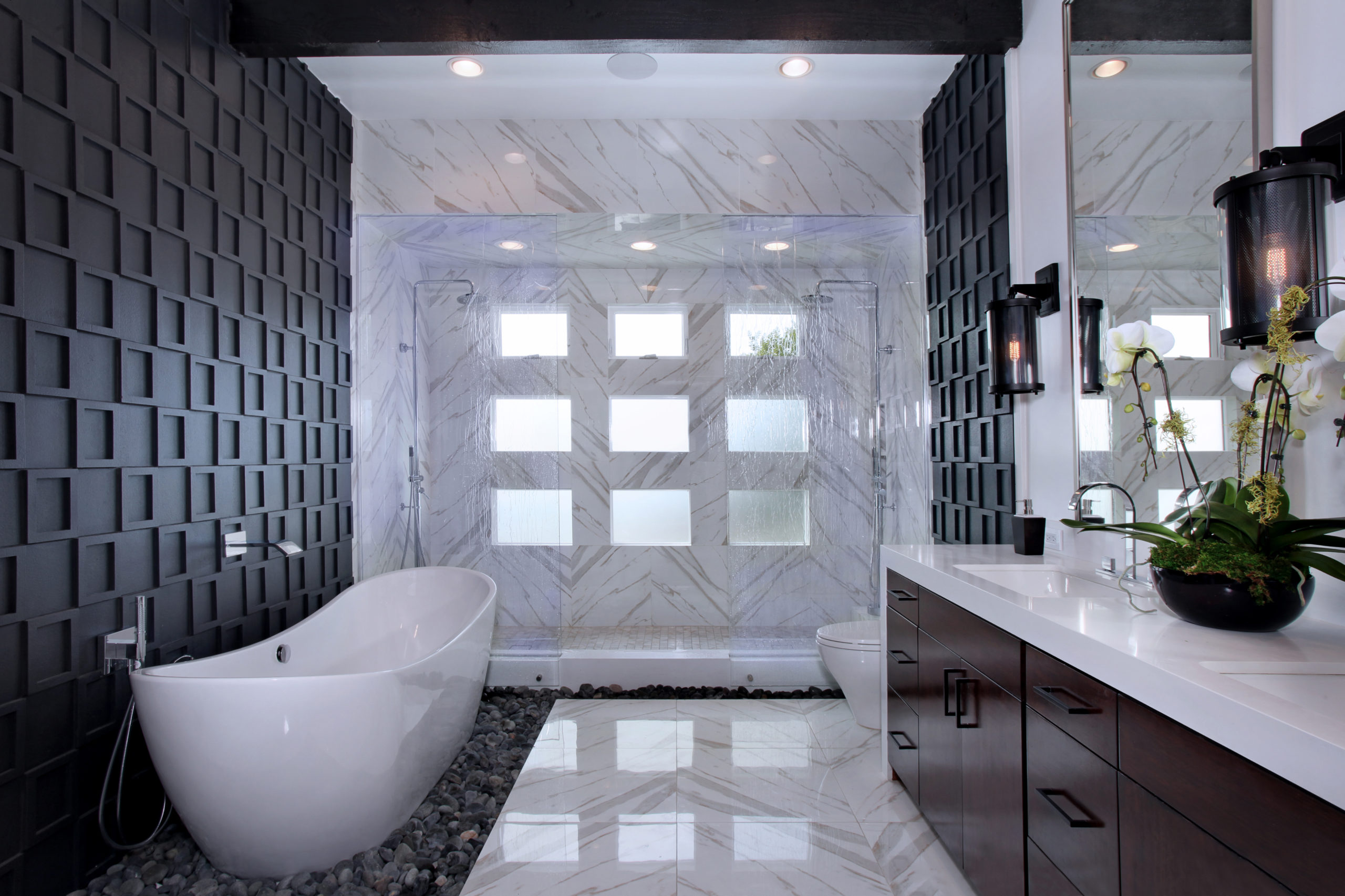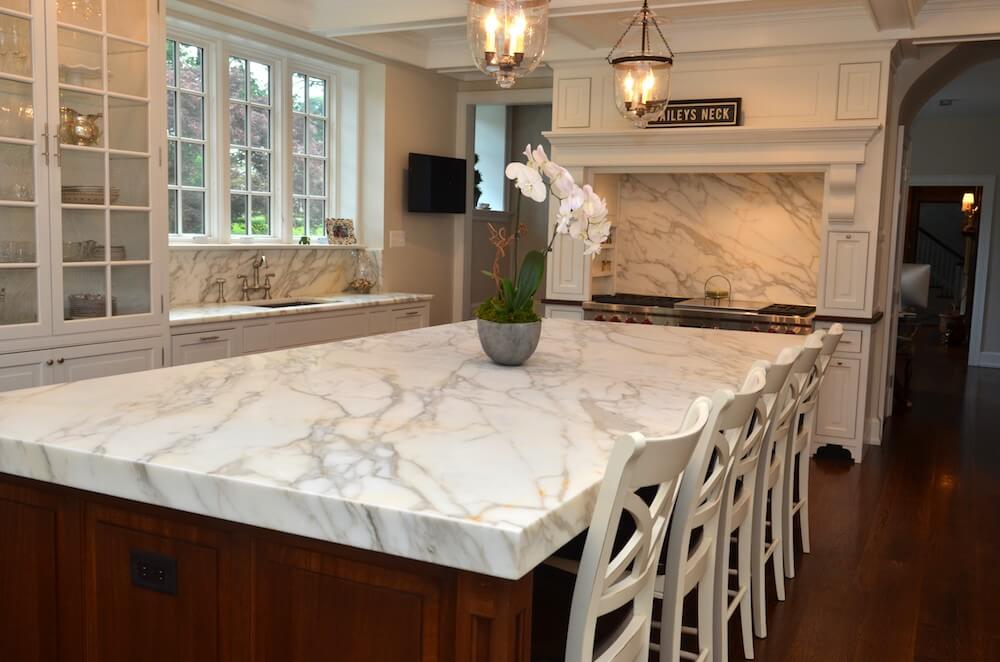From vehicles, food, clothing, and beyond, many care deeply about making eco-friendly choices now more than ever — and when it comes to countertops, engineered stone is among the most environmentally sensitive options you can opt for. An alternative to natural stone cut from marble or granite, this engineered composite features crushed stone (often quartz crystals) bound in slab form with an adhesive. In fact, due to the high percentage of quartz crystals found in these countertops, the material is often simply referred to as quartz.
This type of countertop offers a bevy of benefits, including durability and timeless beauty. However, a particularly wondrous advantage we’ll take a look at today is the fact that engineered stone countertops are astoundingly low maintenance. While that quality is undoubtedly a substantial selling point, it still pays to know exactly what to do — and what not to do — after having your quartz countertop installed. Can you clean it like you would a natural stone countertop? What should you do about spills? Does it scratch? Let’s take a closer look at maintenance tips for your quartz or other engineered stone countertop:
Quartz Routine Care and Cleaning
Quartz can be easily cleaned with a mild detergent, water, and a soft cloth. Make sure to rinse and dry thoroughly. Abrasive, harsh chemicals in cleansers (such as those that contain bleach) or scouring pads should not be used with quartz. While engineered stone surfaces do not require polishing to maintain their shine and smoothness, they should be cleaned gently to maintain their distinctive glow. Some quartz colors and finishes such as honed, matte, etc., are more sensitive to grease or fingerprints, and may need extra care during routine cleaning.
Quartz Stain Removal
While they are stain-resistant, quartz countertops aren’t entirely stain-proof, so it’s advisable to wipe up liquids as soon as possible. Quartz resists stains for a short period, but all colored liquids should be cleaned up as soon as possible. A glass cleaner, such as Windex, can be used along with a non-abrasive sponge for particularly dried-on or tough stains. For deep cleaning, spray a liberal amount on the countertop surface, leave on for about ten minutes, then wipe away. If a particularly stubborn stain — such as nail polish — holds its own against this wipe down, a mixture of acetone, Ajax, and water that’s applied and wiped away immediately may do the trick.
Gently scrape away hardened grease, gum, and paint with a plastic knife or razor blade. After its removal, apply a degreasing cleanser. Remove ink or permanent markers with an oil-based cleanser such as Goo Gone. Rinse with warm water promptly.
Do Different Types of Engineered Stone Countertops Need Different Maintenance?
Different brands of engineered countertops manufacture products largely comprised of quartz. Since the quartz makeup of these engineered stone countertops fall within a relatively modest range, the maintenance needs for each brand’s products will not differ considerably. Bonding agents and pigments that account for the remainder of the materials give manufacturers a great deal of control when it comes to color options and patterns, letting quartz countertops deliver on stain-resistance, resilience, and beauty.
Preventing Quartz Countertop Damage
- Avoid using metal knives or utensils directly on the quartz countertop, as metal can scratch it. When chopping vegetables, slicing bread, or preparing other kinds of food with sharp utensils, make sure to utilize a cutting board.
- Use hot pads or trivets for pans, crockpots, and electric skillets. Quartz countertops can resist temperatures up to 300 degrees Fahrenheit, but can undergo thermal shock with quick changes in temperature and become damaged.
- Avoid pressure or force on your engineered stone countertops, such as dropping a heavy pot, as the stone can chip or crack.
Frequently Asked Questions About Quartz
Should I Use Quartz Inside or Outside?
While quartz is popular for interior spaces, there are several benefits to installing quartz in your outdoor kitchen or similar environment — however, it’s important to avoid direct sun exposure. Factor in the location of the sun and consider installing your quartz countertop in a shaded area. Excessive sun exposure can lead to issues such as discoloration, warping, or voiding of your warranty. Consider your outdoor kitchen design and place your countertop where it can be protected under an awning or at an angle that the sun cannot reach to keep your surface looking as gorgeous as the day it’s installed.
Can I Use Quartz in My Bathroom?
Unlike natural stone countertops, which are typically porous and need sealing, quartz countertops are waterproof. This makes for a mildew-free, clean surface that requires minimal maintenance and is ideal for bathrooms — including the countertops, shower walls, and shower benches. While quartz is not heat-proof, it can handle steam just fine. This engineered stone is an excellent choice for both bathrooms and kitchens, but quartz surfaces in bathrooms may differ in maintenance frequency to prevent water stains.
How Much Heat Can Quartz Withstand?
It’s important to remember that quartz is heat-resistant — not heat-proof. This means it can fare well in your typical kitchen environment or even a fireplace facade, but direct heat — such as placing a scorching pan right out of the oven — takes a toll on the resin makeup of the material, typically resulting in a brown or yellow scorch mark.
Learn More About Maintaining Your Quartz or Engineered Stone Countertop Today
With engineered stone at the helm, keeping your bathroom or kitchen countertops clean and beautiful has never been easier. For more information about our engineered stone products, including Cloudburst Concrete quartz and White Storm Silestone, contact our team today.





